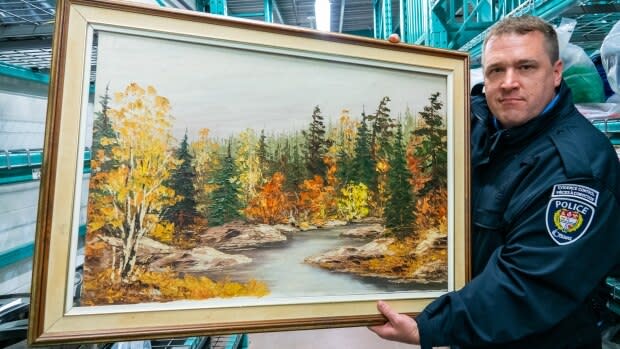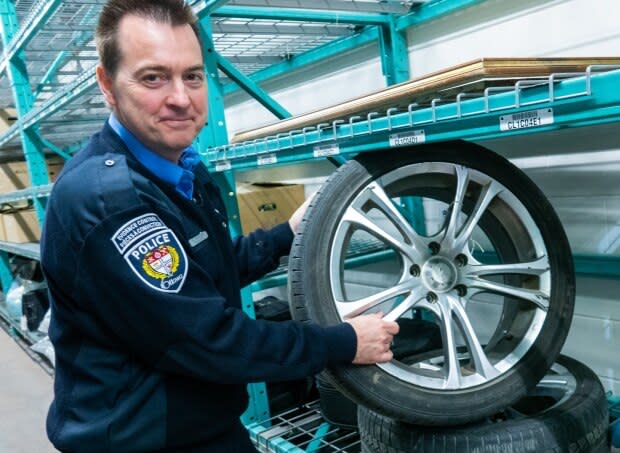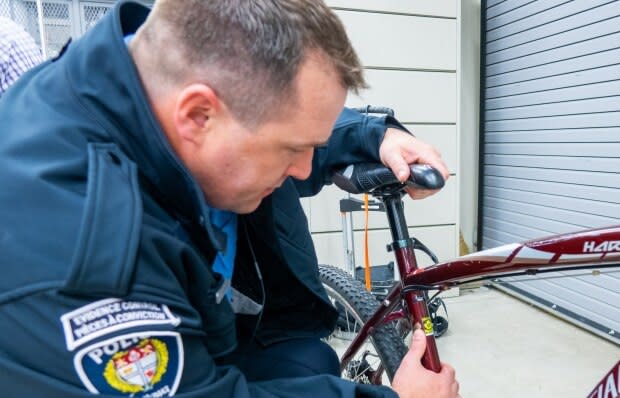'You get a lot of hugs': Looking for a match at Ottawa's last stop for lost and stolen stuff
If you happen to be missing a framed landscape painting, a set of golf clubs, a banjo or a bike — especially a bike — it might be waiting for you to reclaim it at the Ottawa Police Service's massive warehouse for lost and stolen stuff in the city's east end.
"We have everything from big toolboxes down to little CDs. Everything you can think of is here in the general warehouse, and there's even bigger stuff in this building. We do have cars," said Bill Keeler, manager of the evidence control centre for the Ottawa police.

The Swansea Crescent warehouse contains approximately 100,000 items that were either collected at crime scenes or reported abandoned on the street. If an item is considered evidence, it's kept separate and is not returned to its owner.
For most other items, police will cross-reference a description with robbery reports. If they find a potential match, they'll make two attempts to contact the owner. If the owner can provide a detailed description and other identifying information such as a serial number, they can come to collect their item.
The warehouse also holds items left behind on OC Transpo buses, and is a final destination for unclaimed luggage from the Ottawa International Airport. Most items are kept for 90 days — or 30 days for bikes.

Bicycle, bicycle
Bicycles are among the most commonly recovered items, earning them their own room at the warehouse.
"We get just an insane amount of bikes," said Jon Rowan, evidence control supervisor at the warehouse. "We're picking up on average maybe five to six per day."

Despite the high number of recovered bikes, police say only around four per cent are ever reunited with their rightful owners because most bike theft victims never bother to fill out a report. Police are hoping a new program called Garage 529, which registers bicycle serial numbers with police and notifies owners if a match is found, will help boost that statistic.
"It's a great tool. We've had a lot of success with it and there's been great buy-in by the public. It's something we believe that is here to stay," Rowan said.
A very costly mistake
Over the years, police have picked up a number of unusual items. On the day CBC visited the warehouse, its inventory included: a banjo, multiple guitars, computers, a large bag of volleyballs, miscellaneous power tools, tires with rims and garden tools. The warehouse also has a special area where guns are kept.

One of the most unusual items was a tombstone from the 1800s, the name engraved on it only partly decipherable. Despite calling local cemeteries, police were never able to find it a final resting place.
They did once return a comforter that was accidentally donated to charity with $10,000 stuffed inside, thanks to identifying receipts that were with the cash.
"So [the owner] was doing some cleaning up and brought it in for donation and didn't realize until after he left the money in there. Luckily, the people at the charity turned it over to the police and we were able to get it back to the rightful owner. So everybody was very happy on that one," Keeler said.

Even if an item has no clear financial value, police will still hold onto it for 90 days.
"It could be something that the grandmother had, or a great-grandmother, and they've lost it either in a move or something happens, and they want that back," Keeler said.
Items that aren't claimed within that window are put up for auction through the Government of Canada's auction site, GCSurplus, and local company Rideau Auctions.

Many happy returns
Reuniting lost or stolen items with their owners is mostly a positive experience, Rowan said, especially as many never expected to see their things again.
"[I see] all the emotions ranging from joy to tears. I've had people tear up getting an older bike that belonged to their mother," he said.
"People are generally very happy to get their property back, and that's what we're trying to do here every day. You get a lot of hugs."


